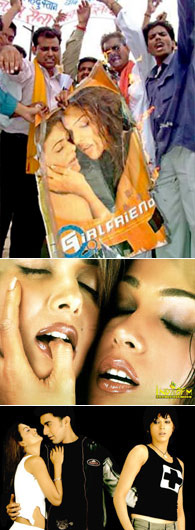No one likes the film - not gay and lesbian groups, women's groups nor religious ones. Cinemas showing the latest Bollywood film Girlfriend were the target of more violence on Tuesday as Hindu activists smashed windowpanes, vandalised cinemas, tore down and burnt posters and billboards in Jabalpur and Indore, and cities in the central Madhya Pradesh state for the second day, police said.

From top: Hindu activists smashed windowpanes, vandalised cinemas and tore down posters and billboards in various cities, publicity stills for Girlfriend.
Police have been posted outside dozens of cinemas, including many swanky multiplexes screening the movie in Lucknow, Varanasi, New Delhi and Mumbai, the capital of India's hugely popular Bollywood industry.
Starring Isha Koppikar and Amrita Arora, Girlfriend is about two women who are best friends and have once shared a sexual encounter. One is shown as being too insecure to get into a relationship with a man because of an incident of childhood abuse, while the other girl appears to lose her orientation after swigging just a few drinks. When one of them falls in love with a man, the other is consumed by jealousy and goes on a psychotic rampage at the end.
Meanwhile, gay activists have clearly noted that they are protesting the film for different reasons than the conservative groups; accusing the film of portraying lesbians as being unnatural and assumes that their sexual preferences are the result of psychological problems.
"Girlfriend reinforces all the negative stereotypes about lesbian and bisexual women," said Chatura, of the Organised Lesbian Alliance for Visibility and Action (OLAVA).
"Not only is it a cheap and titillation-oriented film masquerading as one that's liberal, but it portrays the minority community in a negative light," said Chatura.
"It has repercussions for people whose parents are trying to come to terms with their sexuality and gives bosses a tool with which to harass us," she said.
Gay activist Ashok Row Kavi said: "We have a major problem with director Karan Razdan for demonising lesbians. The film takes our sexual identities and makes a joke of them."
An open letter to the director, published in the Mid-Day newspaper, Tejal Shah, member of a women's organisation, Forum Against Oppression of Women, lamented that the film would dent decades of campaigns by gay rights activists.
"(The) film contains the worst possible misnomers about same sex attraction. More than two decades of work done by gay and lesbian activist groups will suffer thanks to this homophobic film," said the letter.
She added that the movie is pornographic and has been made entirely to give pleasure to heterosexual males. "All the negative popular myths about lesbians [have] been woven into the storyline, and I think it will antagonise society even further," she said.
Claiming homosexuality to be an affront to Indian culture, members of the Shiv Sena are planning more protests. Arun Pathak, a leader of the group, told Reuters: "We'll not allow such a film to be screened. What one does in the bedroom and bathroom should not be displayed publicly."
Gay rights campaigners have also made it clear they were not making a common cause with the conservative camps although they too were protesting the film.
Ashok Row Kavi of Humsafar Trust, a leading national NGO working in the Men who have Sex with Men sector, called on people to stand with them in opposing the Sena's efforts at silencing our sexuality.
"We're not going to allow the Sena to do this to us. They didn't bother when the same director's previous film, Hawas which was also all about lust and sex, was released, so why is it that this film is being targeted?" asked Row Kavi.
Director Karan Razdan, who insists he made neither a pro nor anti-lesbian film, believes that "the hysteria is not because of the film's content but because they're trying to take political mileage from a film that is doing well."
He added that the movie was about a woman who becomes a lesbian due to her circumstances rather than her sexual orientation at birth.
"The film is a tragic story of a girl who has to remain a closet lesbian because society can't handle it. Lesbians should be accepted in society because freedom of sexual preference should be allowed in a free and democratic country," Razdan said.
Fire, a film by Indian-born director Deepa Mehta, also drew the ire of Hindu hardliners in 1998 because it featured a relationship between two women.
